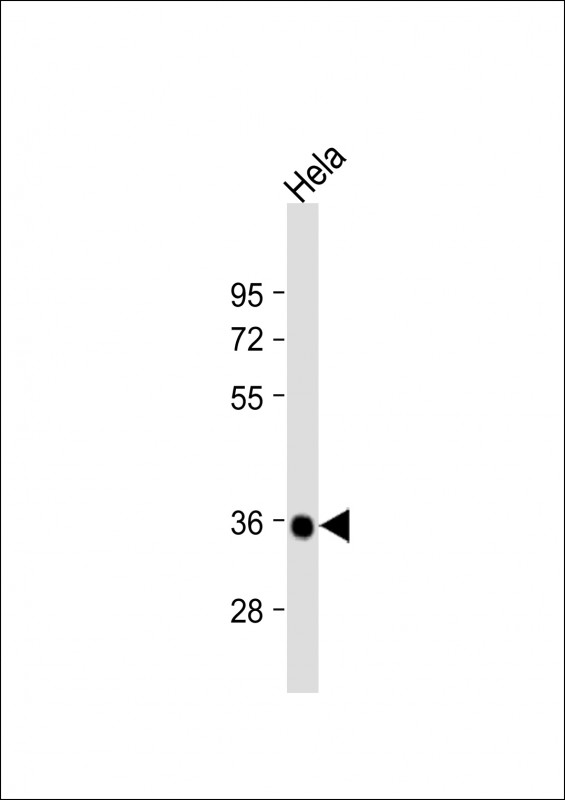Deoxyguanosine Kinase (DGUOK) Antibody (C-term)
Purified Rabbit Polyclonal Antibody (Pab)
- 产品详情
- 实验流程
- 背景知识
Application
| WB, E |
|---|---|
| Primary Accession | Q16854 |
| Other Accession | NP_550438 |
| Reactivity | Human |
| Host | Rabbit |
| Clonality | Polyclonal |
| Isotype | Rabbit IgG |
| Calculated MW | 32056 Da |
| Antigen Region | 241-271 aa |
| Gene ID | 1716 |
|---|---|
| Other Names | Deoxyguanosine kinase, mitochondrial, dGK, DGUOK, DGK |
| Target/Specificity | This Deoxyguanosine Kinase (DGUOK) antibody is generated from rabbits immunized with a KLH conjugated synthetic peptide between 241-271 amino acids from the C-terminal region of human Deoxyguanosine Kinase (DGUOK). |
| Dilution | WB~~1:1000 E~~Use at an assay dependent concentration. |
| Format | Purified polyclonal antibody supplied in PBS with 0.09% (W/V) sodium azide. This antibody is prepared by Saturated Ammonium Sulfate (SAS) precipitation followed by dialysis against PBS. |
| Storage | Maintain refrigerated at 2-8°C for up to 2 weeks. For long term storage store at -20°C in small aliquots to prevent freeze-thaw cycles. |
| Precautions | Deoxyguanosine Kinase (DGUOK) Antibody (C-term) is for research use only and not for use in diagnostic or therapeutic procedures. |
| Name | DGUOK |
|---|---|
| Synonyms | DGK |
| Function | Phosphorylates deoxyguanosine and deoxyadenosine in the mitochondrial matrix, with the highest efficiency for deoxyguanosine (PubMed:11687801, PubMed:17073823, PubMed:23043144, PubMed:8692979, PubMed:8706825). In non-replicating cells, where cytosolic dNTP synthesis is down-regulated, mtDNA synthesis depends solely on DGUOK and TK2. Phosphorylates certain nucleoside analogs (By similarity). Widely used as target of antiviral and chemotherapeutic agents. |
| Cellular Location | Mitochondrion {ECO:0000250|UniProtKB:Q9QX60}. |
| Tissue Location | Ubiquitous. Highest expression in muscle, brain, liver and lymphoid tissues. |
For Research Use Only. Not For Use In Diagnostic Procedures.
Provided below are standard protocols that you may find useful for product applications.
BACKGROUND
Mitochondrial deoxyguanosine kinase (DGUOK) is required for the phosphorylation of several deoxyribonucleosides and certain purine deoxykribonucleoside analogs widely employed as antiviral and chemotherapeutic agents. Purine deoxyribonucleoside analogs are extensively used in treatment of lymphoproliferative disorders. These compounds are administered as pro-drugs, and their efficiency is dependent on intracellular phosphorylation to the corresponding triphosphates. In mammalian cells, the phosphorylation of purine deoxyribonucleosides is mediated predominantly by 2 deoxyribonucleoside kinases: cytosolic deoxycytidine kinase (DCK) and mitochondrial deoxyguanosine kinase (DGUOK also known as DGK). DGUOK expression is ubiquitous, with highest levels in muscle, brain, liver and lymphoid tissues. Defects in DGUOK are a cause of mitochondrial DNA depletion syndrome (MDS). MDS is a clinically heterogeneous group of disorders characterized by a reduction in mitochondrial DNA (mtDNA) copy number. Primary mtDNA depletion is inherited as an autosomal recessive trait and may affect single organs, typically muscle or liver, or multiple tissues. Mitochondrial DNA depletion syndromes are phenotypically heterogeneous, autosomal recessive disorders characterized by tissue-specific reduction in mtDNA copy number. Affected individuals with the hepatocerebral form of mtDNA depletion syndrome have early progressive liver failure and neurologic abnormalities, hypoglycemia, and increased lactate in body fluids.
终于等到您。ABCEPTA(百远生物)抗体产品。
点击下方“我要评价 ”按钮提交您的反馈信息,您的反馈和评价是我们最宝贵的财富之一,
我们将在1-3个工作日内处理您的反馈信息。
如有疑问,联系:0512-88856768 tech-china@abcepta.com.























 癌症的基本特征包括细胞增殖、血管生成、迁移、凋亡逃避机制和细胞永生等。找到癌症发生过程中这些通路的关键标记物和对应的抗体用于检测至关重要。
癌症的基本特征包括细胞增殖、血管生成、迁移、凋亡逃避机制和细胞永生等。找到癌症发生过程中这些通路的关键标记物和对应的抗体用于检测至关重要。 为您推荐一个泛素化位点预测神器——泛素化分析工具,可以为您的蛋白的泛素化位点作出预测和评分。
为您推荐一个泛素化位点预测神器——泛素化分析工具,可以为您的蛋白的泛素化位点作出预测和评分。 细胞自噬受体图形绘图工具为你的蛋白的细胞受体结合位点作出预测和评分,识别结合到自噬通路中的蛋白是非常重要的,便于让我们理解自噬在正常生理、病理过程中的作用,如发育、细胞分化、神经退化性疾病、压力条件下、感染和癌症。
细胞自噬受体图形绘图工具为你的蛋白的细胞受体结合位点作出预测和评分,识别结合到自噬通路中的蛋白是非常重要的,便于让我们理解自噬在正常生理、病理过程中的作用,如发育、细胞分化、神经退化性疾病、压力条件下、感染和癌症。






